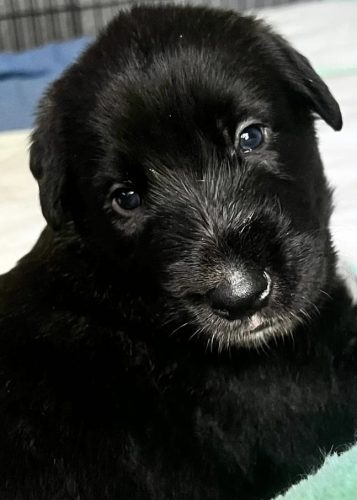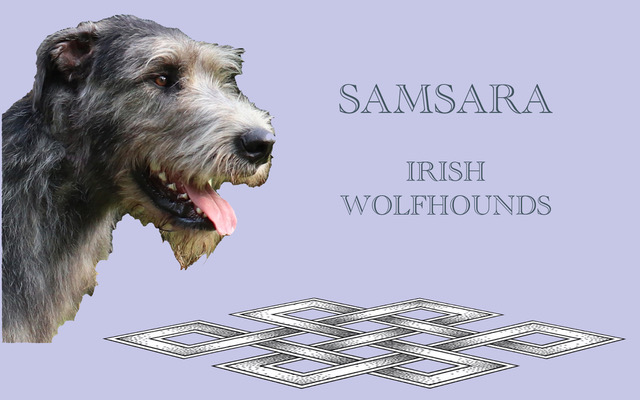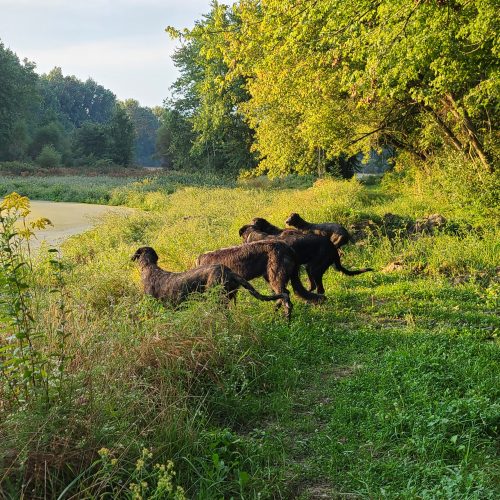
Irish Wolfhounds are supposed to be robust and sturdy. However, this is not always the case. In fact, especially during their first year of life, these hounds are rather fragile and delicate. Like in any other breed, there are health issues across the lifespan which require thoughtful diagnosis and careful treatment, and, especially during the rapid growth phases, need regular monitoring. The difference is the cost associated with treating Irish Wolfhounds. Giant dogs = exorbitant expenses! Given the explosion of cost associated with veterinary care, potential owners of an Irish Wolfhound need to be very clear about what it means to financially care for such a hound. Chances are you will, at one point, face a life or death decision, and no wolfhound should be euthanized just because there is no money to treat whatever the ailment may be. In addition, not every veterinarian is familiar with the breed. Many have never seen a single one in their practice. This makes finding the right veterinary hospital where the breed is understood extremely important.
Health issues can start in puppyhood, especially those pertaining to growth disorders commonly found in youngsters of large and giant breeds. These include panosteitis (pano), hypertrophic osteodystrophy (HOD), and osteochondritis dissecans (OCD), the latter being commonly found in the shoulder. While many youngsters tend to outgrow mild cases of these disorders, more severe cases often require ongoing veterinary care and, in some instances, even surgery followed by intense rehabilitation. Just because your hound experiences growth related challenges, it does not mean you did something wrong. Nor is it an indication you purchased a puppy from a bad breeder. Growing out a wolfhound successfully depends on many different factors, and a year full of growth is plenty of time for something to go wrong with bones, joints, tendons and ligaments. Elbow and hip dysplasia are most often found in adult hounds. While the incidence of these two problems is very low in the breed, they do occur. If they do, they need careful management to prevent pain and suffering.
Adult Irish Wolfhounds are also prone to several cardiac issues, especially atrial fibrillation (A-Fib) and Dilated Cardiomyopathy (DCM). Heart problems are not always a death sentence as they can be treated quite well, also for longer periods of time. Treatment for cancer, the number one cause of death in the breed, especially bone cancer, is unfortunately not always an option. Gastric dilatation-volvulus (GDV or “bloat” or “torsion”) is always an emergency and can, if not treated immediately, lead to death. A surgical procedure called gastropexy, meaning “tacking” the stomach to the body wall, can prevent this emergency and is oftentimes a good option to add when the hound is spayed or neutered.
Pneumonia is another serious problem in the breed which can lead to death if not recognized and treated immediately. Unfortunately, this condition may not present itself like it does in other breeds, making it oftentimes difficult to recognize.
We strongly recommend that potential owners familiarize themselves with breed specific health issues, build an emergency kit to be able to buy themselves some time if a life threatening situation arises, and save up some money. Alternatively, a health insurance offers some peace of mind, especially when purchased right after the new puppy moved in. At this time, the puppy is determined free from pre-existing conditions. Several of our puppy buyers opted for an insurance, and in some cases, it has already paid off: for emergency surgery for swallowing a foreign object, severe diarrhea w/ dehydration, cutting the pad in the foot, and chiropractic care.
For more information on Irish Wolfhound health, please check out the following links (also available via the Links-section on this website):
Irish Wolfhound Club of America (and connection w/ Irish Wolfhound Foundation, the place for all things research): https://www.iwclubofamerica.org/home
Irish Wolfhound Health Club UK: https://www.iwhealthgroup.co.uk/about-us.html
Orthopedics:
Juvenile Orthopedic Disease in Dogs and Cats, Part 2: Congenital and Neonatal Orthopedic Diseases


